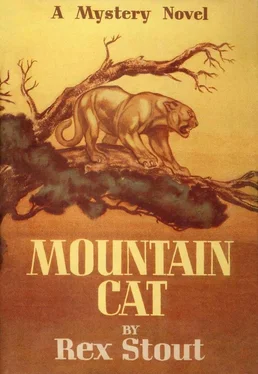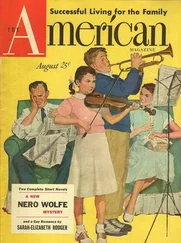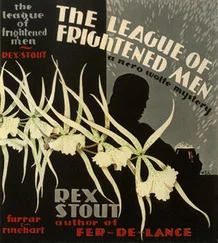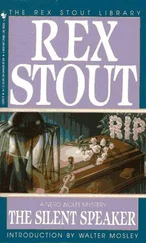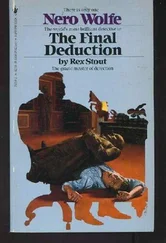Clara nodded. “He is, but—”
“But you don’t know how I knew it. I guess I’ve got one or two friends left up at that courthouse. By the time this is over I’ll have more than Baker has or I won’t have any. Maybe you remember I made him stop questioning you yesterday morning. Even then, when he thought Dellie here had done it, he was starting to get his nose dirty. Now he’s had a talk with the governor and he’s already sunk a pick, and I can’t stop him that way. So I’m making a few motions. It’s important about you, Clara. You must have seen and heard a lot in that office without trying to. I want to ask you, don’t talk to Baker. Don’t even see him. I’m asking you for me and for Amy. Will you do it?”
Clara said, “All right.”
“Don’t go to see him. If he comes here don’t let him in, and if he gets in don’t talk to him. If he arrests you, phone Harvey Anson right away.”
“But good heavens — what can he arrest me for?”
“As a material witness. That don’t mean anything. The judge will fix a low bail and Anson will have you out in five minutes. Will you do it?”
“Yes.”
Sammis nodded. “I thought you would. You’re good girls. But you want to realize what you’re signing for. If this happens, if he arrests you and you’re released on bail, the county and the whole state are going to buzz. About you. That’s what people are like. But you already know that, even at your age, the way they’ve been buzzing about your dead mother and that preacher Toale. They ought to have their necks wrung, the whole damn caboodle! What won’t they say about Amy or you or anyone if they’ll say that Lucy Brand sneaked down to that cabin with a gun and murdered her husband? I don’t — what’s the matter?”
Delia was on her feet, staring, her mouth hanging open. Clara was gazing at him, also speechless.
He repeated, “What’s the matter?”
“What you said,” Clara gasped. “That they say—”
“That your mother killed your father? Sure they do. Now I’m sorry I mentioned it, I might have known no one would say it to you. But they say it, all right. That she killed him — you might as well have it all if you’ve got some — she killed him because she thought he was carrying on with Amy, which is a lie too, and she took the money off him, and her hiring the detectives was a bluff, and that preacher Toale found it out somehow, and he worked on her and remorse worked on her until she killed herself. They even say—”
“Shut up, Lem,” Evelina commanded him.
Delia, still staring, was in her chair again, gripping the arms of it. Clara said in a low incredulous tone, “But that — that’s horrible.”
Evelina stood up. “When you’re a fool you’re a good one,” she told her husband disgustedly. “What the hell good would it do to say that even if they had already heard it?” She waddled to Clara and patted her on the shoulder. “Forget it, girlie. There’s more coyotes in the hills than anything else. Come on, Lem. We’ve got to get back to Amy. It’s nearly ten o’clock.”
“I’m not going back to Amy. I’ve got to see—”
“Well, I am, and you’ve got to take me. Come on before you make a bigger fool of yourself.”
Lem halted in front of Clara to ask, “Can I count on you?”
“Yes. You can count on me.”
“Good. I’m sorry if I — holy smoke, I—”
“All right. That’s all right. I’ll let you out.”
Delia didn’t know if she responded to the good nights. She was aware of them in the hall, and of the door opening and closing, and then was aware that her sister was back in the room, standing in front of her.
She looked up. “Well?”
Clara didn’t say anything.
“When Rufus Toale came to see you — these last two weeks — did he say that?”
“No.” Clara turned abruptly and went back to the front hall. In a moment Delia followed. Clara was pulling on a wrap she had taken from the rack.
“Where are you going?”
“I’m going to see Toale.”
“I’m going, too.”
“No, Sis. No, you’re not.” Clara had the wrap on. “I’m the older. I insist, I beg — you know very well you’re excitable. Please, Sis. I’m just going to find out.” She opened the door. “Please, Del?”
“All right.”
Delia went onto the porch, and called to the form of her sister receding in the dark, “Hurry back!” She stood there until she saw the car turn from the driveway into the street, and then re-entered the house. After she got into the front room she remembered that she hadn’t closed the front door, but that was of such vast unimportance that she didn’t go back to shut it. Instead she flung herself onto the couch, face down, and, not having cried in her jail cell, did so now.
The crying ended after a while; her shoulders stopped shaking and shudders no longer ran over her; but she stayed with her face buried in the cushion. She had thought that she had things pretty well figured out there in her cell, and now here was this. The town where her father had lived and worked, where she and her sister had been born and gone to school and had danced at parties and had given parties at their house — the people of that town were saying that her mother had murdered her father. That finished everything; that was enough — but here she was again, not thinking. She must think about it, and first she must decide in what way it could be thought about...
When the phone rang she answered it to stop its ringing — and it might be Clara or Ty. But it was someone at the county attorney’s office, asking why Clara wasn’t there. She didn’t know what to say, whether to say that Clara would not go, so she merely told him that she had left the house at twenty minutes to ten. After she had hung up she looked at her watch: ten after. It took only four or five minutes to drive to the parsonage and Clara might be back soon. She threw herself onto the couch again.
She had promised Ty she would go to bed and try to sleep, and one of the things she had decided in jail was that she would keep all promises, but she wouldn’t go upstairs until Clara returned. There would be no sense in that. Anyway, she had to think. One thing to think about was what to do. She and Clara would go away, would leave Wyoming. There was nothing — there was Ty. What about that? What kind of a feeling was it that he had for her, and what kind did she have for him? Had he heard what people were saying about her mother? If he had, shouldn’t he have told her? Wouldn’t a man in love with a girl tell her a thing like that?...
Was that a car in the driveway, or was it next door? Clara? No, it hadn’t gone on to the garage. Probably next door. Wouldn’t a man in love with a girl?...
The footsteps — now on the steps, now on the porch — were certainly not Clara’s, they were much too heavy. She wouldn’t answer the door no matter how long they rang; she should have turned out the lights. But she had left the door open! The steps were in the hall! She jerked herself up, swinging her feet to the floor, and saw the Reverend Rufus Toale entering the room, his face white, wearing no smirk and displaying no blandness.
Rufus Toale kept on coming, advancing with a heavy dragging tread. At the big chair in front of the couch, lately occupied by Lem Sammis, he stopped, resting his hand on its back; then he edged around it and lowered himself with ridiculous carefulness onto its seat. Delia started to rise, but her knees wouldn’t take it. She sat and stared.
When he spoke he didn’t begin with “Praise God,” and his voice was as preposterous as his manner of movement had been and his white face still was. Instead of being deep and sonorous and musical, it was little better than a hoarse squeak as he said one word: “Clara?”
Читать дальше
